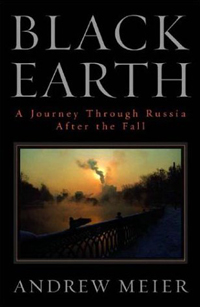 BLACK EARTH: A Journey through Russia after the Fall by Andrew Meier BUY THIS BOOK |
Andrew Meier’s Black Earth is a travelogue of epic proportions. In its finely written pages Meier, Moscow correspondent for Time from 1996 to 2001, recounts a reportorial odyssey that took him to every point of Russia’s compass, even to Chechnya and the Siberian Arctic. He writes movingly of his encounters with Russians who, in the aftermath of the Soviet collapse, “saw little of the rewards of the new era but felt much of the pain,” who lived “without the slightest expectation that anything good could come to a people who deserved so much better.”
Meier journeys north to the Arctic city of Norilsk, a nickel mining center “at the edge of civilization” — “a severed world, a Pompeii of Stalinism” inhabited by the zeks (the Gulag’s slave laborers) and their descendants. Located at the 69th parallel, Norilsk is literally built on the bodies of Stalin’s victims: bulldozers at local construction sites regularly unearth piles of human bones, evidence of the Gulag’s lethal brutality. In this treeless, severely polluted outpost of 200,000 — the world’s northernmost city — male life expectancy has slipped to fifty since the fall of the Soviet Union; and the hospitals, nurseries, schools and sanatoriums that Stalin’s heirs ordered built are now dilapidated or derelict. Now called Norilsk Nickel, the Kombinat that administers the region’s mines and smelters has begun to “right-size” its workforce, laying off thousands in a cost-saving measure welcomed by company owner Vladimir Potanin, one of Russia’s reigning oligarchs. Potanin, Meier notes, is a regular at La Voile Rouge, a St. Tropez hotspot where Russian bankers, surrounded by their courtesans and concubines, douse themselves and each other with Dom Perignon in periodic “Champagne Wars.”
Tracing the Trans-Siberian route taken by Anton Chekhov, who visited the Russian Far East in 1890, Meier travels east to the island of Sakhalin. Like Norilsk, Sakhalin is a former prison colony: the Devil’s Island of Tsar Alexander III, where the katorzhany — criminals and political undesirables — were forced to labor with shackles on their hands and feet. (Chekhov’s longest prose work, The Island of Sakhalin, recounts the abuse these settlers suffered at the hands of their warders.) In Sakhalin, Meier observes, the coal mines, canneries, and pulp mills that once supplied the Soviet mainland are now closed: all were shuttered during Yeltsin’s decade of free market reform. Despite its rich petroleum reserves (Sakhalin’s northeastern shelf allegedly holds more oil than the North Sea floor), the island is among Russia’s poorest regions, with per capita income hovering at $35 per month. The foreign oil consortiums developing new fields have brought no bonanza to Sakhalin. Unemployment is high, and the few Russians who find work on offshore rigs are relegated to the most dangerous jobs. Meier meets three of them on SakhEnergy’s Moliqpaq rig — their bodies coated with toxic sludge as they link and unlink “giant pipes . . . several times their size.” On this island dear to Exxon-Mobil, gasoline prices are the highest in Russia.
Meier makes his way south to Chechnya, where he investigates a massacre perpetrated by kontraktniki — mercenaries — in the pay of Putin’s regime. In Moscow, he meets the parents of a soldier killed by Chechen guerrillas, a young conscript slaughtered after rebel fighters paid their way through Russian checkpoints to ambush his unit. The officers who took the Chechens’ money are nowhere to be found, Meier learns. No one has been punished. The soldier’s anguished father, a 28-year veteran of the Soviet army, asks Meier a question he cannot answer: “Can a country live without a conscience?”
Indeed, what can be said about a country whose rulers have no conscience or common sense of moral obligation? Meier quotes approvingly from Alexander Herzen, the nineteenth-century revolutionary who shared Marx’s exile in London: “The death of contemporary forms of social order ought to gladden rather than trouble the soul,” Herzen declared. “But what is frightening is that the departing world leaves behind it not an heir, but a pregnant widow. Between the death of the one and the birth of the other, much water will flow, a long night of chaos and desolation will pass.”
Dean Ferguson is an editor of Transformation, a newly launched literary journal. He lives and works in San Francisco.
|
| Print
